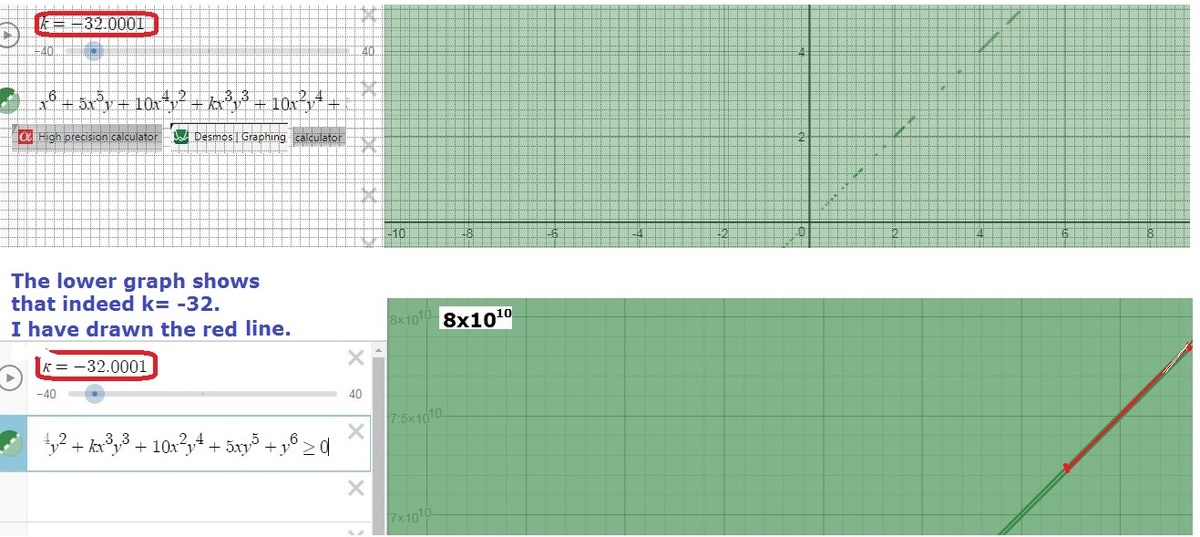5th Row Coefficients, 6th Row Terms
x 6 + 5 x 5 y + 1 0 x 4 y 2 + k x 3 y 3 + 1 0 x 2 y 4 + 5 x y 5 + y 6 ≥ 0
Find the absolute value of the smallest possible k such that the inequality above is true for all non-negative reals x and y .
Note:
You may use the algebraic identities below.
- ( x + y ) 5 = x 5 + 5 x 4 y + 1 0 x 3 y 2 + 1 0 x 2 y 3 + 5 x y 4 + y 5
- ( x + y ) 6 = x 6 + 6 x 5 y + 1 5 x 4 y 2 + 2 0 x 3 y 3 + 1 5 x 2 y 4 + 6 x y 5 + y 6
The answer is 32.
This section requires Javascript.
You are seeing this because something didn't load right. We suggest you, (a) try
refreshing the page, (b) enabling javascript if it is disabled on your browser and,
finally, (c)
loading the
non-javascript version of this page
. We're sorry about the hassle.
2 solutions
I don't know Muirhead's Inequality, so I don't know what conditions are necessary for it to work, but I believe your solution is wrong (if your solution is wrong im suspecting it was due to ignoring the sign of k). I moved everything but the k term to the RHS and then divided by x^3y^3. This would not change the direction of the inequality since, as stated by the problem, the terms are positive. Next, I put the RHS in terms of a = (x/y) + (y/x). This resulted in k >= -(a^3 + 5a^2 + 7a -10). Therefore, the minimum of (a^3 + 5a^2 + 7a -10) needs to be found. This can be done with a simple derivative test leading to a minimum -10. This leads to k >= -(-10) or k >= 10.
edit: darn it i forgot that the only minimums were for negative numbers therefore the minimum was just for a = (x/y) + (y/x) = 0. this yields a minimum of a = 2 which leads to 32
Log in to reply
To show that Muirhead is simply a more powerful version of AM-GM, I will prove each of the above inequalities with AM-GM only.
INEQ 1: x 6 + y 6 ≥ 2 x 3 y 3
We have, by AM-GM, 2 x 6 + y 6 ≥ x 6 y 6 so x 6 + y 6 ≥ 2 x 3 y 3 as desired.
INEQ 2: x 5 y + x y 5 ≥ 2 x 3 y 3
By AM-GM, 2 x 4 + y 4 ≥ x 4 y 4
and rearranging gives x 4 + y 4 ≥ 2 x 2 y 2
Multiplying both sides by x y gives x 5 y + x y 5 ≥ 2 x 3 y 3 as desired.
INEQ 3: x 4 y 2 + x 2 y 4 ≥ 2 x 3 y 3
By AM-GM, 2 x 2 + y 2 ≥ x 2 y 2
Rearanging gives x 2 + y 2 ≥ 2 x y
Multiplying both sides by x 2 y 2 gives x 4 y 2 + x 2 y 4 ≥ 2 x 3 y 3 as desired.
Looks like you figured out your own mistake.
Muirhead's Inequality is a generalization of the AM-GM inequality. You can find out more about it here .
Nice problem
Log in to reply
Thanks! I was trying to make a problem involving Muirhead, and now I have! (even though it is still doable with AM-GM--see my comment below)
I edited your problem for clarity please review it for accuracy.
A small point: something needs to be said showing that -32 is the least such k, i.e. that the bound is tight. (Testing vs. x=y=1 suffices.)
you can also am-gm 32 terms

Sorry to say, the entire Details and Assumptions, along with the title, some of the tags, and the problem itself, were just red herrings, trying to persuade you that Pascal's Triangle and the Binomial Theorem had something to do with it. The solution (at least the intended solution) has nothing to do with them, at all.
First, move the k x 3 y 3 term to the right side of the equation. We can just let the resulting − k coefficient be k since we'll be taking the absolute value of it anyways at the end. x 6 + 5 x 5 y + 1 0 x 4 y 2 + 1 0 x 2 y 4 + 5 x y 5 + y 6 ≥ k x 3 y 3
Now, note that ( 3 , 3 ) ≺ ( 6 , 0 ) , ( 5 , 1 ) , and ( 4 , 2 ) ; thus, by Muirhead's Inequality, x 6 + y 6 ≥ 2 x 3 y 3 x 5 y + x y 5 ≥ 2 x 3 y 3 x 4 y 2 + x 2 y 4 ≥ 2 x 3 y 3
This means ( x 6 + y 6 ) + 5 ( x 5 y + x y 5 ) + 1 0 ( x 4 y 2 + x 2 y 4 ) ≥ 2 x 3 y 3 + 5 ( 2 x 3 y 3 ) + 1 0 ( 2 x 3 y 3 ) = 3 2 x 3 y 3
Thus, our answer is 3 2 .